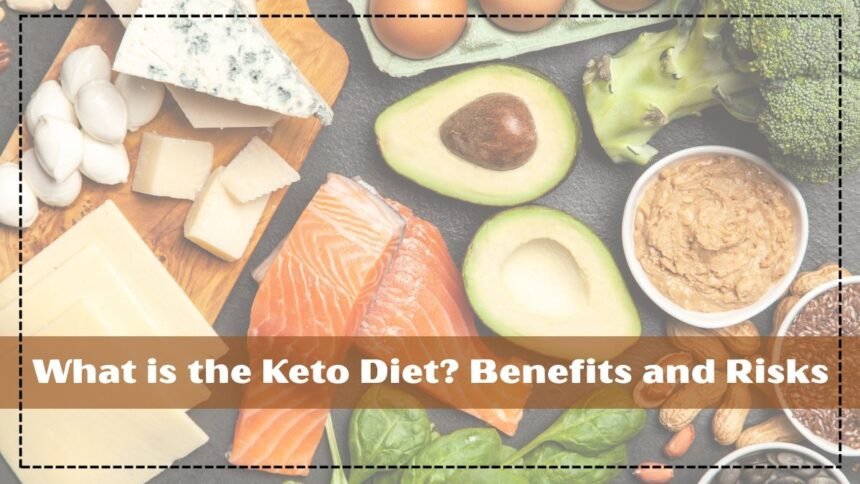Introduction
The Keto Diet has taken the world by storm as a popular way to lose weight, improve health, and boost energy levels. But what exactly is the ketogenic diet, and how does it work?
Whether you’re a beginner looking to start your keto journey or someone curious about its potential risks and benefits, this guide will give you everything you need to know.
READ MORE :- What is a Balanced Diet ? The Ultimate Guide to Healthy Eating
What is the Keto Diet?
The Keto Diet (Ketogenic Diet) is a low-carb, high-fat diet that helps your body burn fat for fuel instead of carbohydrates. It works by putting your body into a metabolic state called
, where it starts using stored fat for energy.
How Does the Keto Diet Work?
Normally, our body gets energy from carbohydrates (glucose). However, in a keto diet, you consume very few carbs and increase fat intake, forcing the body to:
Burn fat instead of carbs
Produce ketones in the liver (which serve as an alternative energy source)
Reduce insulin levels, leading to better fat-burning and weight loss
Types of Keto Diets
There are several versions of the keto diet, including:
- Standard Ketogenic Diet (SKD) – Most common (75% fat, 20% protein, 5% carbs)
- Cyclical Ketogenic Diet (CKD) – Includes carb-refeeding days
- Targeted Ketogenic Diet (TKD) – Allows extra carbs before workouts
- High-Protein Keto Diet – Higher protein intake (60% fat, 35% protein, 5% carbs)
Each type has its benefits, but Standard Keto Diet (SKD) is the most widely followed.
Health Benefits of the Keto Diet
The keto diet isn’t just about weight loss. It has several science-backed health benefits, such as:
1. Rapid Weight Loss
- The body burns fat more efficiently in ketosis, leading to faster weight loss than regular diets.
- Studies show that keto diets help people lose 2-3 times more weight than low-fat diets.
2. Improved Brain Function
- Ketones provide a steady energy source for the brain, reducing brain fog.
- Some studies suggest that keto diets may help with Alzheimer’s and epilepsy.
3. Reduced Blood Sugar & Insulin Levels
- Keto diets lower insulin resistance, making them beneficial for type 2 diabetics.
- It can help manage blood sugar levels and reduce the risk of diabetes.
4. Increased Energy & Endurance
- With a steady fat-based energy source, keto eaters often experience fewer energy crashes.
- Ideal for athletes and fitness enthusiasts.
5. Heart Health & Cholesterol Control
- Keto can increase good HDL cholesterol and lower triglycerides.
- Helps in maintaining better heart health by reducing bad cholesterol.
6. Potential Cancer-Fighting Benefits
- Some research suggests that the keto diet may slow cancer growth by cutting off cancer cells’ glucose supply.
- More studies are needed, but initial research is promising.
7. Anti-Inflammatory Benefits
- Keto reduces inflammation, which is linked to chronic diseases like arthritis and heart disease.
Foods to Eat on a Keto Diet
To stay in ketosis, focus on low-carb, high-fat foods:
Best Keto Foods
Healthy Fats – Avocados, olive oil, coconut oil, butter
Protein – Meat, poultry, eggs, fatty fish (salmon, tuna)
Low-Carb Veggies – Spinach, broccoli, cauliflower, zucchini
Dairy – Cheese, Greek yogurt, heavy cream
Nuts & Seeds – Almonds, walnuts, chia seeds, flaxseeds
Keto-Friendly Snacks – Dark chocolate (85%+ cocoa), pork rinds
Foods to Avoid
Sugary Foods – Soda, candy, cakes, pastries
Grains & Starches – Bread, pasta, rice, oats
High-Carb Fruits – Bananas, grapes, apples
Processed Foods – Chips, fast food, fried items
Legumes – Beans, lentils, chickpeas
Potential Risks & Side Effects of Keto Diet
While the Keto Diet has many benefits, it also comes with some potential risks:
1. Keto Flu
- In the first week, many people experience headaches, fatigue, dizziness, and nausea.
- This is called the Keto Flu and usually lasts 3-7 days.
Solution: Drink more water, electrolytes (sodium, potassium, magnesium), and bone broth.
2. Digestive Issues
- Some may experience constipation due to a lack of fiber.
- Solution: Eat low-carb vegetables and drink plenty of water.
3. Nutrient Deficiencies
- Eliminating carbs may lead to deficiencies in vitamins like B, C, and fiber.
- Solution: Take a multivitamin and eat a variety of keto-friendly veggies.
4. Possible Heart & Kidney Issues
- High protein intake can put stress on the kidneys.
- A high-fat diet may affect cholesterol in some individuals.
5. Long-Term Sustainability
- Some people find the keto diet hard to maintain long-term.
- Solution: Try a Cyclical Keto Diet (CKD) or Targeted Keto Diet (TKD) for flexibility.
Is the Keto Diet Right for You?
The Keto Diet is great for:
People looking for rapid fat loss
Those with type 2 diabetes or insulin resistance
People who want better brain function & energy
Athletes who need steady energy levels
However, it may not be suitable for:
Pregnant women (without medical supervision)
People with kidney disease
Those with a history of eating disorders

Final Thoughts
The Keto Diet is a powerful tool for weight loss, improved brain function, and overall health. However, it’s important to understand the risks and listen to your body.
If you’re planning to start keto, make sure to:
Eat the right keto foods
Stay hydrated and manage electrolytes
Consult a doctor if you have existing health conditions
Would you try the Keto Diet? Let me know in the comments below!
Conclusion
The Keto Diet is a powerful approach to weight loss, improved energy levels, and better overall health. By switching to a low-carb, high-fat diet, your body enters ketosis, where it burns fat for fuel instead of carbohydrates.
While the benefits of keto—such as weight loss, blood sugar control, and mental clarity—are impressive, it’s essential to consider potential risks like the Keto Flu, digestive issues, and long-term sustainability.
If you’re looking for fast fat loss, stable energy levels, and improved brain function, the keto diet may be worth trying.
However, if you have certain medical conditions or difficulty maintaining restrictive diets, consult a doctor before starting keto.


















